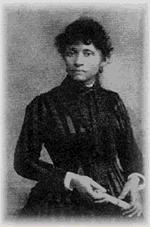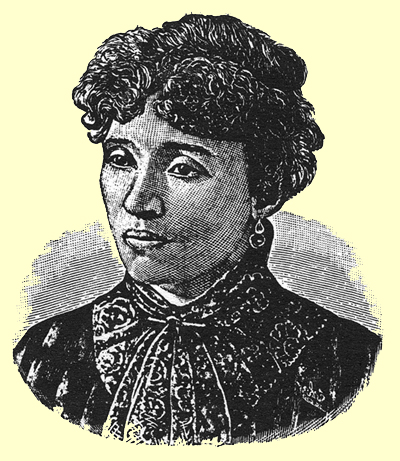

 The life of Lucy Parsons and the struggles for freedom and justice she engaged in provide remarkable insight about the history of the American labor movement and the anarchist and socialist struggles of the time. Born in Charlotte, Virginia in 1851 as an enslaved person, Lucy Parsons was an anarchist labor activist, who fought against the injustices of poverty, capitalism, and the state her entire life. She was African American but identified as Native American and Mexican (a persona some historians believe was fabricated). After relocating to Waco, Texas, she later moved to Chicago in 1873 with her husband, Albert Parsons, where she began organizing workers and led thousands of them out on strike protesting poor working conditions, long hours, and for the abolition of wage slavery. After Albert, along with seven other anarchists, were eventually imprisoned or hung by the state for their political beliefs, Lucy Parsons achieved international fame in their defense and as a powerful orator and activist in her own right. The impact of Lucy Parsons on the history of the American anarchist and labor movements has served as an inspiration spanning now three centuries of social movements. While most people remember Lucy Parsons in relation to the events surrounding her husband, Albert, and their comrades' executions (known as the Haymarket affair), Lucy's own legacy and passions have a long and courageous life history all their own. Lucy was known for her writings, her courage as a dissident woman of color, her unbending allegiance to social justice, and, most of all, her powerful, fiery public speeches. She led tens of thousands of workers into the streets in mass protests, drew enormous crowds wherever she spoke, and was considered a dangerous, explosive and robust threat to authorities across the United States. For over 30 years her lectures were monitored by police and sometimes shut down, arresting her before she ever reached the podium. Hearing Lucy speak sparked a passion for rebellion in working and poor people everywhere she appeared. The Chicago police labeled Lucy Parsons "more dangerous than a thousand rioters." Lucy made her living as a dress maker, and by charging for lectures and selling books and pamphlets. The remainder of her time was spent raising her two children (Lulu and Albert Jr), and constantly working on behalf of a plethora of social justice causes. Along with her closest comrade, Lizzie Swank Holmes, much of her time was devoted to free speech fights by default, as her own ability to speak, like her executed husband, was always at stake. She also dedicated herself to the struggles of the Scottsboro Eight in Alabama, and wrote articles condemning lynchings in the south. Her work also included defense of other anarchists and labor activists on trial for false charges, such as Sacco and Vanzetti and Tom Mooney and Warren Billings. Lucy spent her later years speaking at May Day events and rallies, and working with the International Labor Defense (a broad-based, but communist-founded, class war prisoners' support group, which has led to a historic fallacy that Lucy was a member of the Communist Party — she was not). Lucy was, however, a socialist before she became an anarchist. Both her and Albert were deeply influenced by Karl Marx; The Communist Manifesto was first published in the U.S. in The Alarm, a newspaper operated by the Parsons. "I, after careful study..." declared Lucy, "turned from a sincere, earnest, political Socialist to the non-political phase of Socialism, Anarchism, because in its philosophy I believe I can find the proper conditions for the fullest development of the individual units in society, which can never be the case under government restrictions". Albert ran for elected office several times before he eventually abandoned the political system and embraced anarchism for his last eight years. Lucy remained steadfast in her dedication to the anarchist cause for the rest of her life. Lucy and Albert Parsons were fashionable anarchists for their day. Lucy adorned her own fabulous outfits, while Albert, a printer and newspaper editor, was always dapper with dyed hair and a perfectly groomed mustache. They were poor most of the time, struggling to pay rent and bills, but they were always stylish. Lucy's biggest commitment as an activist was with the labor movement, as she spent most of her energy engaging in anarcho-syndicalist struggles against capitalists and the state. Her outlook was grounded firmly in class analysis, as she believed that issues such as racism were primarily the product of class inequalities, used by the ruling elites to divide the prolétaire. Her approach to politics, in this regard, could be interpreted as class reductionist, but she believed, alongside many militant anarchist labor activists of the day, that superficial divisions among workers must be put aside so that they can join together around the world, strike and overthrow their corporate, and thus government, masters. Lucy was a member of the Knights of Labor, one of the first serious labor federations in the country, and a founding member of the International Working People's Association (IWPA), a militant anarcho-syndicalist labor organization. The IWPA aimed to unite workers across various trades and advocate for their rights, emphasizing direct action and armed class resistance as a form of self-defense against state violence and capitalist exploitation. The IWPA was pivotal in supporting Lucy throughout her many struggles over the years. In 1905, Lucy helped found the Industrial Workers of the World (IWW), which advanced some of the ideas of the IWPA, expanded them and led a wave of massive strikes and labor actions. The IWW aimed to build a new world within the shell of the old (otherwise known as prefigurative politics). The IWW included white, black, and immigrant union workers fighting to overthrow the capitalist system, which was both pioneering and radical for its time. Lucy's fearless devotion to the anarchist movement, her notoriety around the Haymarket affair, and her powerful orations had an enormous influence on world and US labor history. While today she is hardly remembered and ignored by conventional narratives about the United States, the legacy of her struggles and her influence within these movements have paved a path of inspiration for generations to come. Lucy Parsons died in a housefire in 1942 at the age of 91. She was buried in the Forest Home Cemetery in Forest Park, Illinois, near the Haymarket Martyrs Monument. Fellow anarchists Voltairine de Cleyre and Emma Goldman are also buried there. Two biographies have been published about Lucy Parsons: Lucy Parsons, American Revolutionary by Carolyn Ashbaugh (1976), and Goddess of Anarchy: The Life and Times of Lucy Parsons, American Radical by Jacqueline Jones (2017).
More Information About Lucy Parsons: Lucy Parsons (1851-1942) By Jacqueline Jones Reflections on the Anarchism of Lucy Parsons By Roxanne Dunbar-Ortiz Lucy Parsons (1853-1942) By Carolyn Ashbaugh Lucy Parsons: Woman of Will By the Women's History Information Project Lucy Parsons: A Life Dedicated to Justice By Caeli Thibeault Lucy Parsons (1853-1942): The Life of an Anarchist Labor Organizer By Joe Lowndes Lucy Parsons: Chicago Revolutionary By Jon F. Rice Revolutionary Woman: La Verded Publications Lucy Parsons: Labor Radical and Anarchist, IWW Founder By Jone Johnson Lewis The Radical Existence Of Lucy Parsons, The "Goddess of Anarchy" By Arionne Nettles Lucy Gonzales Parsons By William Loren Katz I am An Anarchist By Lucy Parsons An Interview with Lucy Parsons on the Prospects for Anarchism in America By Lucy Parsons Related Articles: Women in the Haymarket Event By Carolyn Ashbaugh Radical Women: Haymarket Tradition By Carolyn Ashbaugh Haymarket Widows By Carolyn Ashbaugh International Working People's Association By Alan Dawley Strange Legacies: The Black International and Black America By Dave Roediger Albert R. Parsons: Anarchist as Trade Unionist By Dave Roediger Other Resources: Goddess of Anarchy: The Life and Times of Lucy Parsons, American Radical by Jacqueline Jones Lucy Parsons: An American Revolutionary by Carolyn Ashbaugh Lucy Parsons: Freedom, Equality & Solidarity, Writings and Speeches, 1878-1937 by Gale Ahrens Lucy Parsons Wikipedia |